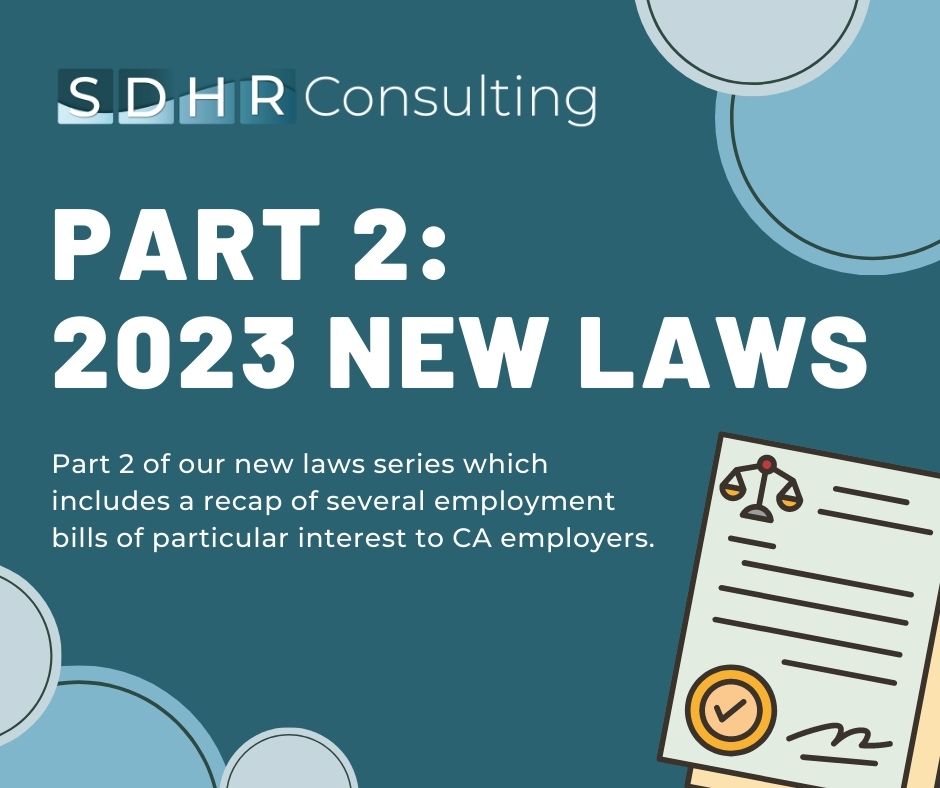
Part 2: Important 2023 Legal Updates for CA
It’s no secret California has had a busy year for new employment-related laws! You can read about many of the laws and regulations employers should be aware of for 2023 in Part 1 of this series: Important 2022/2023 Legal Updates for California.
To make sure we keep our clients fully informed, our Legal Update – Part 2 covers additional current employment laws that may apply to California employers.
AB 257: Fast Food Accountability and Standards Recovery Act (FAST Recovery Act)
Breaking News: On December 5th, restaurant industry groups may have obtained enough signatures to put the FAST Recovery Act on hold. However, it will take a few weeks for the State to review and validate the signatures. If there are enough signatures, this law will be on hold until November 2024 when it will be added to the ballot as a referendum for CA voters to decide.
AB 257 establishes a counsel to regulate fast food chains. A fast food chain is defined by the law as a set of restaurants consisting of 100 or more establishments nationally that share a common brand or have standardized decor, marketing, packaging, products and services. The establishments primarily focus on food or beverages for immediate consumption, where customers pay when they order, and items are prepared in advance and with limited or no table service.
The council will operate until January 1, 2029, and have 10 members appointed by the Governor, the Speaker of the Assembly, and the Senate Rules Committee. The purpose of the council will be to establish minimum standards on wages, working hours and other working conditions affecting the health, welfare and safety of CA fast food employees.
The council is not allowed to develop regulations requiring predictive scheduling, to amend current statutes or to create new paid time off benefits. However, they are permitted to establish a minimum wage for 2023 that can be up to $22 per hour with increases in subsequent years of no more than 3.5% or the rate of change set by the US Bureau of Labor Statistics, whichever is lower.
SB 523: Reproductive Health Decision Making – Contraceptive Equity Act
SB 523 adds reproductive health decision-making to the protected classes under the CA Fair Employment and Housing Act. Reproductive health decision-making includes a decision to use or access a particular drug, device, product or medical service for reproductive health. Employers, labor organizations, apprenticeships, training programs and licensing boards are prohibited from discriminating against employees and applicants based on their reproductive health decision-making. They are also prohibited from making the disclosure of this information, a condition of employment, continued employment or a benefit of employment.
AB 984: Vehicle Tracking and Privacy Rights
AB 984 includes provisions regarding employers’ use of devices in vehicles to determine the location or movement of employees. Monitoring is defined as “locating, tracking, watching, listening to or otherwise surveilling the employee.”
Employers must give employees written notice prior to installing these devices. They may monitor them during work hours only and only if it is strictly necessary for the performance of their duties. The notice must include several pieces of information. Below is a sampling of the information that must be included. A full list can be found in AB 984, Section 3 (f)(3).
- A description of the specific activities that will be monitored.
- A notification of whether the data gathered through monitoring will be used to make any employment-related decisions, including, disciplinary and termination decisions.
- A description of the dates, times, and frequency that the monitoring will occur.
- A notification of the employee’s right to disable monitoring, including vehicle location technology, outside of work hours.
AB 1601: Call Center Relocation
AB 1601 originally required a call center that intends to relocate from CA to give the Labor Commissioner at least 120 days’ notice before the relocation. The bill sent to the Governor was drastically updated by the legislature and now requires the owners of a call center to follow the California WARN requirements. This means they must give employees who will be subject to a mass layoff, relocation or termination a minimum of 60 days’ notice prior to the relocation. A call center is defined by the law as a facility or other operation where employees as their primary job duty receive phone calls or other communication and provide customer service or other related services.
SB 951: Increases to Payments for CA Disability and Paid Family Leave
SB 951 increases the payments an individual can receive from CA State Disability Insurance and Paid Family Leave beginning January 1st, 2025. Employees who earn less than about $27,000 a year would receive 90% of their regular wages, up from 70%, and those who earn more would receive 70%, up from 60%. The extra costs will be partially paid for by removing the cap on workers contributions above $145,000.
CA Paid Family Leave Grant for Small Employers
Employers who have less than 100 employees, may be eligible for a grant of $1,000 or $2,000 per employee who received Paid Family Leave payments after June 1, 2022, to help cover costs the employer incurred by recruiting and/or training a replacement for the employee who is on leave.
More information is available at CA PFL Grant. The website currently says grant funds are not available right now, however, you can sign up for the waitlist and submit information about your company and the employee(s) for consideration. Grant money will be available until May 31, 2024, or until funds run out.
Understanding how these various laws affect the workplace is crucial for employers and employees alike. An important step for organizations to take is updating their employee handbook for 2023. Our team of HR consultants is available to assist with handbook updates and questions regarding new laws. Contact us for more information.
